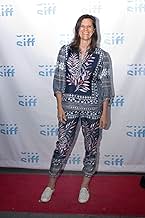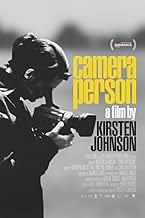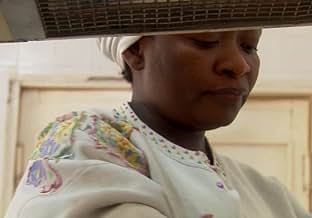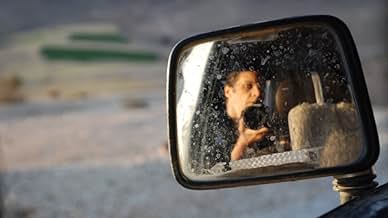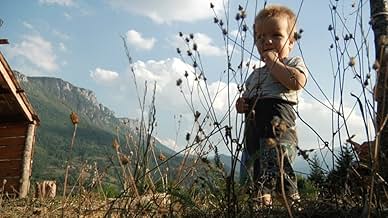AVALIAÇÃO DA IMDb
7,4/10
3,5 mil
SUA AVALIAÇÃO
Adicionar um enredo no seu idiomaExposing her role behind the camera, Kirsten Johnson reaches into the vast trove of footage she has shot over decades around the world. What emerges is a visually bold memoir and a revelator... Ler tudoExposing her role behind the camera, Kirsten Johnson reaches into the vast trove of footage she has shot over decades around the world. What emerges is a visually bold memoir and a revelatory interrogation of the power of the camera.Exposing her role behind the camera, Kirsten Johnson reaches into the vast trove of footage she has shot over decades around the world. What emerges is a visually bold memoir and a revelatory interrogation of the power of the camera.
- Direção
- Roteiristas
- Artistas
- Prêmios
- 23 vitórias e 38 indicações no total
Jacques Derrida
- Self
- (cenas de arquivo)
- Direção
- Roteiristas
- Elenco e equipe completos
- Produção, bilheteria e muito mais no IMDbPro
Avaliações em destaque
Kirsten Johnson's 2016 visual memoir. Johnson, a camera woman (or person to be fair) who has worked for years on documentaries compiles a series of scenes from the films she's shot to deliver a personal travelogue which ranges in locations as Gitmo, Africa, Bosnia & even her own homestead featuring unique glimpses of people like Bosnian survivors of their genocide from the recent past, child birth in Africa, & even her own young twin children at an early age. Perhaps one of the lingering moments from the film is footage from her mother (who passed away from Alzheimer's complications) still alive & while not being mentally vibrant, the image of her still walking among the living (at a time when she had long passed) is heartfelt & gripping. Nothing resembling a traditional narrative can be found here but if you're in interested in the visual mind of an artist & where they were at a given time, this is one for you.
Much has been said about this film. It's not your typical documentary on a specific issue or topic. It's also not a completely straight-forward autobiography, but I do think it's some type of autobiography that, while unique, still very much reveals something about the subject. The subject in question here is Kirsten Johnson, and all of the images and footage chosen to be shown to us do tell us something about her. Despite not really talking about her own life or only appearing on camera for a few seconds, the images and her interactions with those around her do give us a glimpse as to who this person is. That is why in that respect it is an autobiography of some sort, the type that shows rather than tells. It's a fascinating picture through and through and highly recommended.
I had such high hopes for this to work. The very title makes a huge promise, and it partly fulfills it, however You might find the Person not as charming as She thinks She is.
There's a dissonance between first two sequences of the film and the whole rest. Whatch these two. These are amazing - there the Camera really is the Person. The whole rest is pedestrian, with too much 'in your face' ideology and self indulgence.
There's a dissonance between first two sequences of the film and the whole rest. Whatch these two. These are amazing - there the Camera really is the Person. The whole rest is pedestrian, with too much 'in your face' ideology and self indulgence.
I was lucky enough to watch this on the big screen which may have given me a bias to my sheer adoration for this film.
I was moved. I feel this captured the sheer power of cinema to give insight into ways of life we have never seen or experienced. The wonderful eye of Kirsten Johnson guides us through her experiences. Her empathy bleeds through the screen and give you a truly breathtaking documentary.
It gives you a moment to detach yourself from the world. And look at it through someone else's eye.
A documentary that isnt worried about teaching you explicit facts, but more letting you empathise and wonder about this world and all of us who reside here.
I captivated from the very first shot to the end of the credits. I will watch this again.
I was moved. I feel this captured the sheer power of cinema to give insight into ways of life we have never seen or experienced. The wonderful eye of Kirsten Johnson guides us through her experiences. Her empathy bleeds through the screen and give you a truly breathtaking documentary.
It gives you a moment to detach yourself from the world. And look at it through someone else's eye.
A documentary that isnt worried about teaching you explicit facts, but more letting you empathise and wonder about this world and all of us who reside here.
I captivated from the very first shot to the end of the credits. I will watch this again.
"Cameraperson" is recent film by veteran documentary cinematographer Kirsten Johnson. It is composed of several different scenes that were filmed by Johnson over her career for various other documentaries all over the world. The images in this film may be familiar to some members of the audience because they were originally filmed for other documentaries. They aren't all final cuts though; many of them are clips of trying to set up the camera or getting the right angle or frame along with clips from the family life of Kirsten Johnson. The first thing that struck me about this film was how captivating it is from the first frame to the last; I could not look away from the screen no matter how opaque the shot might seem at the moment. The first twenty to thirty minutes or so will have most members of the audience, including myself, confused as to what exactly the point of the images we are seeing is. Patience is required in the viewing of this film. Once it clicks, and you'll know when it does, it becomes all the more engaging. This film tells many stories, not chronologically, but nonetheless effectively and perhaps all the more moving. At its core, "Cameraperson" is an autobiography of Kirsten Johnson. But it is also a meditation on human suffering, the wonder of the world around us, the ethics of nonfiction film, the sadly ironic contrast between the beauty of nature and the extent to which it can be defiled by evil, and an examination of the filmmakers own family. We see her in scenes taking place at her New York apartment, home in Colorado Springs, and far away ranch as she interacts with her mother, a victim of Alzheimer's disease, her father and her twin boys. These scenes are surrounded by scenes of shepherds in the Bosnian Mountains, desert plains, city streets, and government black sites. The ethics of documentary filmmaking, as I mentioned earlier, are also examined. Is it more moving to see images of a body that has been torn to shreds after being dragged by a truck, or to see the chain that dragged him being held by the prosecutor as he speaks about the atrocity? This question is answered in one scene, split in to two parts and book-ending several other scenes. In the first scene, we see the lawyer talking about the book of images that they distributed to the jurors to prevent causing further pain by having to show them in trial. The second comes directly after a conversation had with a film professor as he talks about the depiction of violence in nonfiction film and how it ultimately ends up being disrespectful, becoming entertainment. We then jump to a cut of the cover of the book of photos; we no longer want to see what's inside as we did before. Bringing attention to the art of filmmaking is also a theme in the film, particularly in recognizing the technical aspects of filmmaking. Most people don't think much about the cinematographer when they think about a great film. Shots are attributed to the director, but this film brings a special attention to the person behind the camera making all the shots work, and staring directly through the lens of the camera into the eyes of human beings. In film, especially nonfiction film, the cinematographer is responsible for establishing the human connection between the audience and the subject. "Cameraperson" does this especially beautifully because at the end of the film, we are able to see how the experiences and people Johnson has filmed connect her to them, us to them and her to us. This is an autobiography not merely because it is a compilation of the footage that has touched her throughout her extensive career, although it is that, but because she has her own story that is also full of pain, loss, love and life just like those she connects with as a Cameraperson.
"Cameraperson" is directed and photographed by Kirsten Johnson, distributed by Janus Films and released by Criterion. It had its premiere on January 26th at the 2016 Sundance Film Festival. It is not rated. I gave it four out of four stars.
"Cameraperson" is directed and photographed by Kirsten Johnson, distributed by Janus Films and released by Criterion. It had its premiere on January 26th at the 2016 Sundance Film Festival. It is not rated. I gave it four out of four stars.
Você sabia?
- CuriosidadesThis film is part of the Criterion Collection, spine #853.
- Citações
Kirsten Johnson: He's coming and he's mad.
- ConexõesFeatured in The Story of Film: A New Generation (2021)
Principais escolhas
Faça login para avaliar e ver a lista de recomendações personalizadas
- How long is Cameraperson?Fornecido pela Alexa
Detalhes
Bilheteria
- Faturamento bruto nos EUA e Canadá
- US$ 102.033
- Fim de semana de estreia nos EUA e Canadá
- US$ 12.760
- 11 de set. de 2016
- Faturamento bruto mundial
- US$ 109.464
- Tempo de duração
- 1 h 42 min(102 min)
- Cor
- Mixagem de som
- Proporção
- 1.78 : 1
Contribua para esta página
Sugerir uma alteração ou adicionar conteúdo ausente




